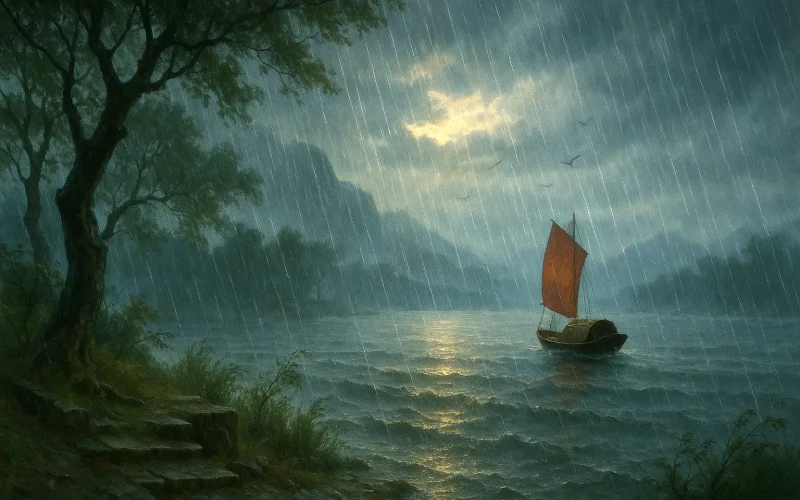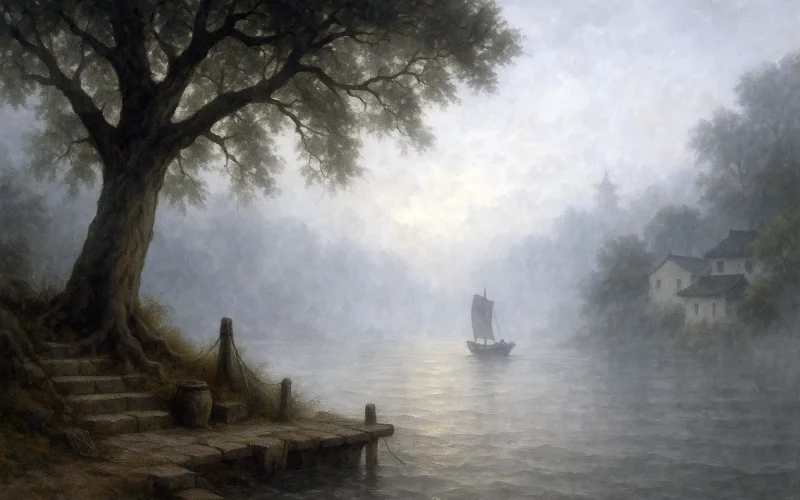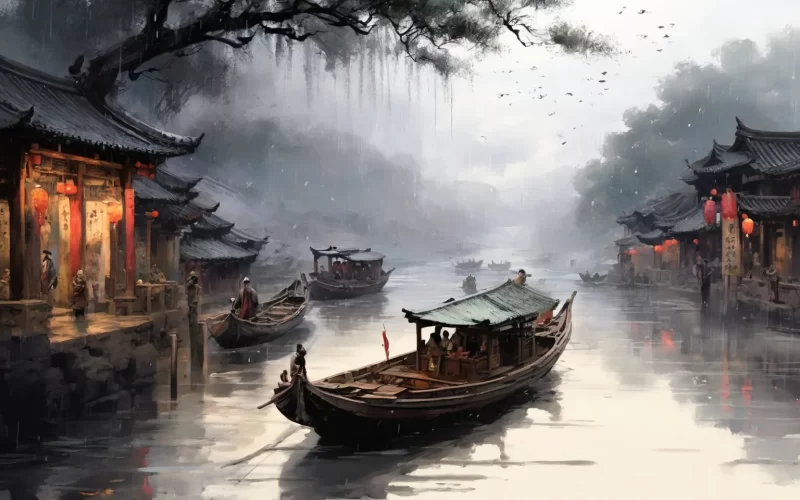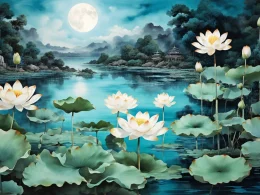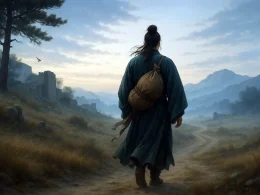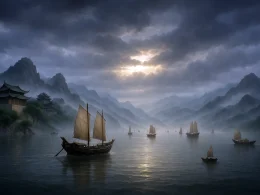Is it raining on the river all the way to Chu? ---
The evening bell comes to us from Nanjing.
Your wet sail drags and is loath to be going
And shadowy birds are flying slow.
We cannot see the deep ocean-gate --
Only the boughs at Pukou, newly dripping.
Likewise, because of our great love,
There are threads of water on our faces.
Original Poem
「赋得暮雨送李曹」
韦应物
楚江微雨里,建业暮钟时。
漠漠帆来重,冥冥鸟去迟。
海门深不见,浦树远含滋。
相送情无限,沾襟比散丝。
Interpretation
Composed during Wei Yingwu's service in Nanjing (ancient Jianye), this poem captures the poignant moment of seeing off his friend Li Cao amid riverine drizzle and twilight bell-tones. As misty rain blends with gathering dusk along the Yangtze, the poet stands witness to his friend's receding boat, transforming the parting scene into a meditation on life's impermanence. Through delicate natural imagery, Wei creates an atmosphere of profound wistfulness—both a documentary of farewell and an embodiment of Jiangnan's melancholic beauty that frequently graces his verses.
First Couplet: "楚江微雨里,建业暮钟时。"
Chǔ jiāng wēi yǔ lǐ, Jiànyè mù zhōng shí.
On Chu's great river, fine rain drifts; Jianye's evening bell tolls through the gloam.
The opening establishes temporal and spatial coordinates—the drizzly Yangtze shoreline at the vesper bell's knell. This desolate tableau sets the poem's elegiac tone.
Second Couplet: "漠漠帆来重,冥冥鸟去迟。"
Mòmò fān lái zhòng, míngmíng niǎo qù chí.
Through gauzy rain, sails loom sodden; In dimming light, birds wing slow-winged.
Wei personifies nature to mirror emotional weight: sails grow "sodden" with symbolic burden, while birds' "slow-winged" flight externalizes reluctant separation. The reduplicatives (漠漠, 冥冥) thicken the atmospheric density.
Third Couplet: "海门深不见,浦树远含滋。"
Hǎi mén shēn bú jiàn, pǔ shù yuǎn hán zī.
Ocean-gates drown in unseen deeps; Riverside trees weep glistening tears.
Vision dissolves into abstraction as the destination ("ocean-gates") vanishes, while riverside trees "weep" with moisture—an exquisite pathetic fallacy bridging external and internal landscapes.
Fourth Couplet: "相送情无限,沾襟比散丝。"
Xiāng sòng qíng wúxiàn, zhān jīn bǐ sàn sī.
Our parting grief—a boundless tide; Drenched robes outpour like rain's own threads.
The climax fuses human emotion with elemental forces. Tears and raindrops become indistinguishable, completing the poem's circular structure by echoing the opening "fine rain."
Holistic Appreciation
The poem progresses through layered intensification—from establishing shots (river, bell) to focal details (sails, birds), then to vanishing points (distant gates) before culminating in emotional overflow. Wei's genius lies in making meteorological phenomena (mist, drizzle) bear the full weight of human sorrow without explicit lament. The closing simile ("like rain's own threads") achieves sublime unity, demonstrating how classical Chinese poetry transforms natural observation into metaphysical resonance.
Artistic Merits
The poem distinguishes itself through its unique subject matter—a farewell scene set in evening rain—presented with extraordinary originality. Masterfully employing the technique of projecting emotions onto scenery, it imbues natural elements with profound affective resonance. Its language is exquisitely refined yet richly suggestive, conveying deep sentiments with restrained elegance. The composition demonstrates meticulous craftsmanship, with perfectly mirrored opening and closing lines that create vivid imagery while achieving boundless artistic conception. Particularly remarkable is the poet's skill in establishing dynamic contrasts between movement and stillness, light and shadow within the landscape, intensifying the unspoken depth of parting sorrow.
Insights
Beyond documenting an 8th-century farewell, the poem reveals how all partings echo nature's cycles—the inevitable ebb and flow of human connections. Wei's tears merging with rain suggest that profound grief ultimately reunites us with the elemental, offering a consoling unity with the cosmos. For contemporary readers, this Tang masterpiece models how to articulate sorrow through nature's language rather than direct complaint, transforming personal loss into timeless artistic truth.
Poem translator
Kiang Kanghu
About the poet
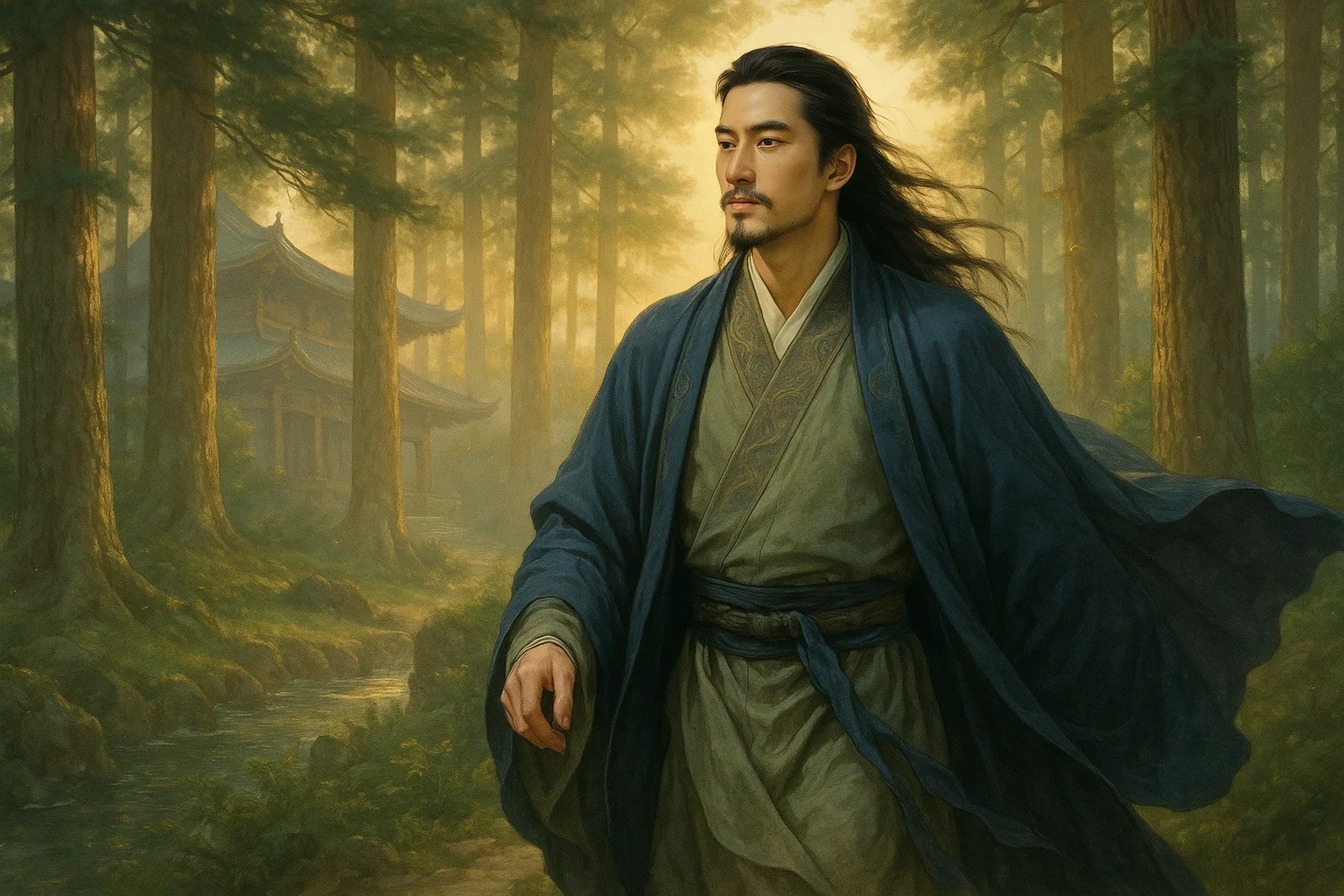
Wei Yingwu (韦应物), circa 737 - 786, was a native of Chang'an, Beijing. His poems were collected in the Wei Suzhou Collection, which included poems concerned with the plight of the people, expressions of disobedience to the times and indignation against the world, and descriptions of idyllic landscapes, etc., of which the ones describing idyllic landscapes are the most famous, and have been sung by posterity in particular.






